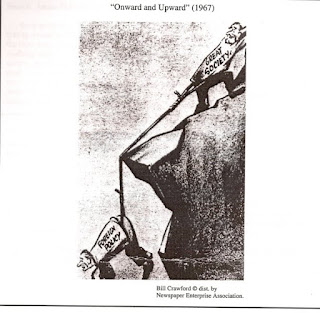This political cartoon is titled Onward and Upward which was illustrated by Bill Crawford. This cartoon was created in 1967, at a time of great conflict during the Vietnam War. Lyndon B. Johnson was president at the time, where he introduced the idea of the Great Society, which followed the pattern of the New Deal by FDR. This “great society” was a set of domestic programs which aimed at eliminating poverty and racial injustice. But, these domestic required lots of spending, but the US had also gotten themselves involved in the Vietnam War which required lots of spending as well. LBJ was judged by not keeping in mind the required balance spending for both domestic and foreign affairs. So in this cartoon, the author utilizes colloquialism, and symbolism in order to portray the very conflict that LBJ was facing.
The use of symbolism is very prevalent in this piece. There are two Lyndon B. Johnsons, one titled the great society, and the other titled foreign policy. The foreign policy is attached to the great society by rope, but the foreign policy is falling off a cliff, almost dragging the great society down the cliff too. This shows LBJ’s plan for the Great Society is being pulled and greatly affected by foreign policy, in reference the spending. This can conclude that maybe the United States is not able to support both the Vietnam War and the Great Society. The face on the foreign policy character is very sad and distraught, but the face on the great society is much more happier and more positive. This reveals that President Johnson is clearly happier with the Great Society than he is with his own foreign policy.
The use of colloquialism is evident in the title of the cartoon, “Onward and Upward”. This phrase or common saying is used to usually encourage someone to forget an unpleasant experience or failure and to think about the future instead. This meaning is quite important to add to the meaning of this cartoon. This shows the author is trying to make a statement about how President Johnson dealt with this issue of foreign affairs versus domestic affairs. Clearly Johnson cares more about the Great Society (domestic) which represents the future, while he is upset and frustrated with his failure of foreign policy.
I believe that the author, Bill Crawford, successfully proved a point about a major point in Lyndon B. Johnson’s presidency. Although I felt positively about LBJ as a president, I do agree with this author of the cartoon. This point of his presidency was probably the weakest point for him, and some could say what caused him to be disliked by many politicians and Americans.
